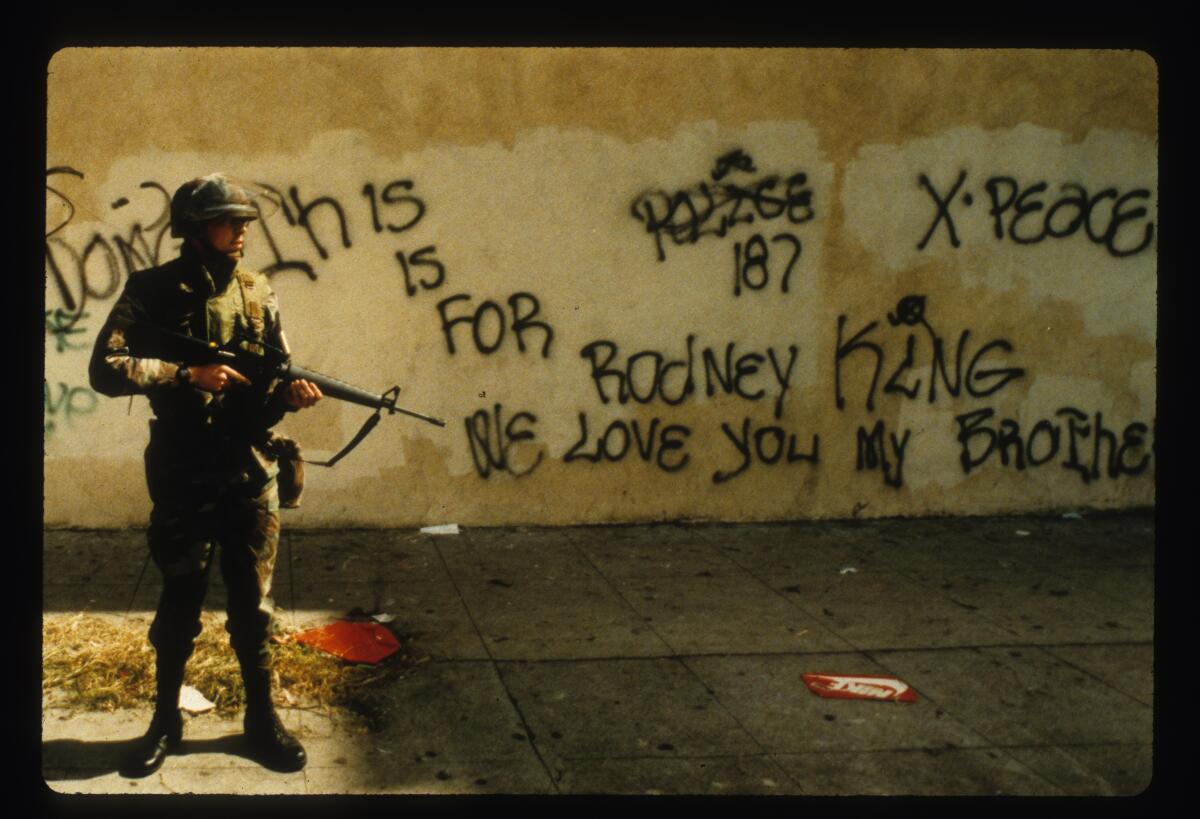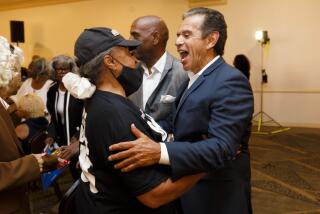Op-Ed: Villaraigosa: We came together after the 1992 uprising. We can do it now

- Share via
On April 30, 1992, I was new to public service as a member of the Southern California Rapid Transit District board. I will never forget the images of that day: the flames, the smoke, the faces of fear and rage. Those images have remained with me, vivid reminders of the anger and frustration felt by people suffering daily humiliations inflicted by public institutions that were rife with bigotry.
I was heartbroken then and heartbroken again today, a full 30 years since the terrible events of that spring, as the people of Los Angeles again face the demoralizing reality that some in city government not only do not have their best interests at heart, but actively conspire against them, in the vilest terms.
The fact that the people caught on an audio recording engaging in this disgusting conversation are Latinos and longtime friends has filled me with a sense of anger that is difficult to articulate.
Tremendous pain has been inflicted on our community and the cause is racism, exposed in both the institutions of this city and the hearts of too many who claim to love it.
I have known the people involved for many years and have seen some of them do great things for our community. But somewhere along the line they veered off course.
The words they used revealed that casual bigotry has been normalized in our civic discourse. These people have failed the test of public service and must accept responsibility, in both words and actions. Nury Martinez, the council president, has resigned from the council. Ron Herrera, the top labor leader in the county, has resigned from the Los Angeles County Federation of Labor. Councilmembers Gil Cedillo and Kevin de León must resign now too.
The responsibility for healing this city isn’t only theirs, however. It is imperative that the roots of racism and the broken city structure are not swept under the rug with the next news cycle.
The days that followed the civic unrest of 1992 were filled with the same kind of pain that I know many Angelenos are feeling today. In the wake of that uprising, the city and community leaders started many encouraging projects and reforms, though too many never quite fulfilled their promise. But we will never forget the strong motivation so many of us all had then to start the hard work of making this city a better place.
I will never forget the sense of unity we had as we joined Edward James Olmos when he led a crowd that began sweeping the streets of South Los Angeles the morning after the uprising. Yes, it was a symbolic act. Eddie didn’t single-handedly clean up the debris left by three days of turmoil. And he didn’t do what he did because he was Latino. He did it because he was a concerned citizen and an Angeleno. Thousands of city residents joined him as I did in that spontaneous cleanup.
We need to harness a similar spirit of unity and resolve now.
The four Latinos caught on the audio recording are responsible for their actions. They don’t speak for the Latino community.
The plain fact is they were trying to act as a bloc within the council to protect their own districts at the expense of other communities of color. While the reason for this conversation was ostensibly “redistricting,” let’s be honest: This was an attempt to hold on to power, regardless of how it affected their constituents. It was the very definition of the worst forms of gerrymandering, something we decry when it happens on a statewide or congressional level, and we cannot tolerate it in this city.
It is true that L.A.’s internal conflicts are rooted in events of the past, and much of the pain and anger from those conflicts remains. But we must guard against repeating the sins of our fathers. We need now to have uncomfortable yet deeply necessary conversations about racism in this city.
I do not believe Latinos bear general responsibility for what those City Council members said. Many who have called for their resignations and protested at City Hall are Latinos disgusted with the words on that audio recording. It is precisely because those words do not represent our values that we must not shy away from doing what we did in 1992 — pick up a broom, sweep out the bigotry and do whatever we need to make the values of equality and justice an essential part of the Angeleno social compact.
Antonio Villaraigosa was mayor of Los Angeles from 2005 to 2013.
More to Read
A cure for the common opinion
Get thought-provoking perspectives with our weekly newsletter.
You may occasionally receive promotional content from the Los Angeles Times.










